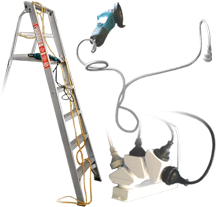Top 10 Rules for Electric Safety
 Top 10 Rules for Electric Safety
Top 10 Rules for Electric Safety
In order to stay safe in and around your home, here are a few safety tips regarding the use of electricity that you should learn as soon as possible.
- Avoid overloading an electrical outlet or extension cord. The problem with overloading an outlet with too many plugs is that it can cause damage to your electrical system, whilst also raising the possibilities of a fire breaking out.
- Ensure that all electric cords are out of the way and are tidy and neat. If you leave electrical cords from your appliances in areas where they could be a hazard, you are increasing the risk of someone falling over them. Plus pets might begin to chew on the cords which can harm them and increase the risk of fire.
- DO NOT ever enter an electrical substation. If your ball or your pet ends up inside the confines of an electrical substation, do not enter. Instead ask an adult to call the electricity company to send someone out who can rescue it for you.
- NEVER tug an electrical cord from the outlet or plug. Violently pulling a cord from the outlet or plug can damage the appliance and put you at risk of electrocution.
- Avoid flying a kite close to power lines. The kite and its string could very well be a good conductor of electricity, and if you fly your kite into overhead power lines, this may send the electricity through you on its way to the ground.
- Ask an adult for assistance when you need to use an appliance that requires electricity.
- Look out for power lines when climbing a tree. Climbing a tree can be great fun, however, branches and leaves can mask the presence of power lines, and therefore, you need to lookout for power lines before you climb and during climbing.
- Get an adult to make sure that there are child-proof safety caps on all of the electrical outlets that aren’t being used.
- Remember to tell your dad or mum about the dangers of overhead power lines when they are using a ladder or other piece of outdoor equipment.
- Always keep electrical appliances and equipment as far away from water as possible. This is because a lot of electrical related mishaps happen at home when an electrical appliance comes in to contact with water.


